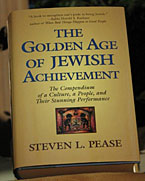Excerpt:
Radio and Broadcast Television©
Today, radio and television are commonplace. We take them for granted as if they had been with us forever. In historic terms, they are relatively young. Radio did not arrive until the 1920s, and television, conceived shortly after radio, was not available to significant audiences until the late 1940s and early '50s. Before them, only the telephone (1870s) and telegraph (1840s) allowed instant communications over long distances, and both were "point to point," allowing only one person to be in touch with one other person.
It was the application of "voice" to Marconi's wireless invention that allowed simultaneous communications to anyone who "tuned in" within range of the "broadcast." With that, everything changed. As suggested by his biography (above), the man who saw this most clearly was David Sarnoff. He was foremost among a number of Jews who largely developed the technologies, products and organizations which made today's radio and television available to the public. In that sense, Jews were as disproportionately involved in radio and television as they were in motion pictures.
Two exhibits make this case. Exhibit 15a shows the inductees into the Radio Hall of Fame. Of its 108 members, at least nineteen (18 percent) are Jews. Representation is even higher in the Television Hall of Fame (Exhibit 15b)which includes thirty-nine Jews among its 108 members (36 percent.) In fact their importance in the early era of television is further demonstrated in the five Jews counted among the first seven inductees.
One way of looking at the growth of radio and television involves the creation of the major networks. They were the vehicle that made radio and television into national, and later international, mediums. Sarnoff realized that organizing local stations into a system of affiliates (a "network") allowed programming and advertising to benefit from economies of scale and the simultaneous transmission of programs to "coast to coast" audiences.
Over the first few years, there were only three significant networks: NBC Red, NBC Blue, and what we now call CBS. Later, in 1934, the Mutual Broadcasting System was created, followed by Dumont (1946) and the Liberty Broadcasting System (1946). In 1943, NBC was forced to sell NBC Blue and it became today's ABC. Of those six, three (Mutual, Dumont, and Liberty) soon died out. Only NBC, CBS and ABC remained until the 1980s when cable and satellite, facilitated the creation of CNN, Fox, Warner, and others. Of the three original networks, all three had Jewish roots....
